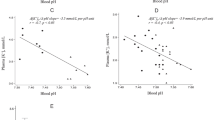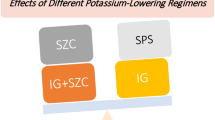Summary
In an open, randomized study, we investigated the effect of oral potassium chloride (KCl) and of potassium citrate/bicarbonate (K-cit/bic) in 42 patients with hypokalemia (≤3.5 mmol/l). In both groups 80 mmol K+ were administered daily. The parameters examined were serum potassium concentration, acid-base status, and urinary electrolyte excretion. Parameters were evaluated on days 0, 2, 4, and 6. With KCl, [K+] increased from 3.2± 0.2 (mean± SD) on day 0 to 3.8± 0.4 mmol/l on day 2 (p<0.005) and 4.0± 0.5 mmol/l on day 4 (p< 0.005). On day 6 [K+] was also 4.0±0.4 mmol/l (p< 0.005 vs day 0). With K-cit/bic, [K+] increased from 3.2± 0.2 to 3.7± 0.4 on day 2, 3.9± 0.5 on day 4, and 4.1± 0.6 mmol/l on day 6 (allp< 0.005 vs day 0). The increase of [K+] was not different between the two groups. Blood pH on day 0 was in the normal range in both groups and did not change significantly during the study. There was a decrease of carbon dioxide partial pressure (pCO2) with KCl from 38.7± 4.9 on day 0 to 36.4± 3.6 on day 2 (p<0.05). On days 4 and 6, pCO2 was back up to the basal level. In contrast, with K-cit/bic, pCO2 rose from 35.0±5.8 mmHg on day 0 to 39.9± 5.8 mmHg on day 2 (p< 0.05). On days 4 and 6, pCO2 was not different from day 0. The increase in urinary potassium excretion was equal in both groups. These results indicate that oral substitution with either KCl or K-citrate/bicarbonate may have only minor effects on the acid-base status under the conditions of the present study. Both potassium salts appeared to be equally effective in correcting hypokalemia via the oral route.
Similar content being viewed by others
Abbreviations
- GFR:
-
glomerular filtration rate
- K-bic:
-
potassium bicarbonate
- K-cit:
-
potassium citrate
- KCl:
-
oral potassium chloride
- pCO2 :
-
carbon dioxide partial pressure
- t.i.d.:
-
three times a day
References
Down PF, Polak A, Rao R, Mead JA (1972) Fate of potassium supplements in six outpatients receiving long-term diuretics for oedematous disease. Lancet II:721–724
Dyncker T, Helmers C, Wester PO (1984) Cardiac dysrhythmias in patients with acute myocardial infarction: relation to serum potassium level and prior diuretic therapy. Acta Med Scand 216:127–132
Fournier G, Pfaff-Poulard C, Methani K (1987) Rapid correction of hypokalemia via the oral route (Letter to the editor). Lancet I:163
Grimm RH, Neaton JD, Elmer PJ, Svendsen KH, Levin J, Segal M, Holland L, Witte LJ, Clearman DR, Kofron P, LaBounty RK, Crow R, Prineas RJ (1990) The influence of oral potassium chloride on blood pressure in hypertensive men on a low-salt diet. N Engl J Med 322:569–574
Haalboom JRE, Struyvenberg A (1982) The mechanism underlying chlorthalidone-induced hypokalemia: effects of sodium restriction, potassium supplementation, spironolactone, and triamterene. Neth J Med 25:184–195
Johannson BW, Dziamski R (1984) Malignant arrhythmias in acute myocardial infarction. Relationship to serum potassium and effect of selective and non-selective β-blockade. Drugs 28 [Suppl 1]: 77–85
Kaplan NM, Carnegie A, Raskin P, Heller JA, Simmons M (1985) Potassium supplementation in hypertensive patients with diuretic-induced hypokalemia. N Engl J Med 312:746–749
Koshman MA (1974) Management of potassium problems during long-term diuretic therapy. JAMA 230:743–748
Morgan DB, Young RM (1982) Acute transient hypokalemia: new interpretation of a common event. Lancet II: 751–752
Nodrehaug JE, von der Lippe G (1983) Hypokalemia and ventricular fibrillation in acute myocardial infarction. Br Heart J 50:525–529
Papademetriou V, Price M, Johnson E, Smith M, Freis ED (1984) Early changes in plasma and urinary potassium in diuretic-treated patients with systemic hypertension. Am J Cardiol 54:1015–1019
Ramsay LE, Boyle P, Ramsay MH (1977) Factors influencing serum potassium in treated hypertension. Q J Med 46:401–410
Schwartz AB, Swartz CD (1984) Dosage of potassium chloride elixir to correct thiazide-induced hypokalemia. JAMA 230:702–704
Author information
Authors and Affiliations
Rights and permissions
About this article
Cite this article
Meyer-Lehnert, H., Evers, W.M. & Krück, F. Potassium substitution via the oral route: Does its efficacy depend on the anion of the potassium salt?. Klin Wochenschr 69, 797–801 (1991). https://doi.org/10.1007/BF01744272
Received:
Revised:
Accepted:
Issue Date:
DOI: https://doi.org/10.1007/BF01744272




